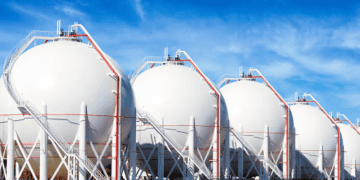In 2024, Europe experienced a significant reduction in liquefied natural gas (LNG) imports, with a 19% decrease compared to the previous year, as reported by the Institute for Energy Economics and Financial Analysis (IEEFA). This decline coincides with the continent’s gas consumption reaching an 11-year low, influenced by policies aimed at reducing gas demand and the increased adoption of renewable energy sources.
The United Kingdom led this downward trend, cutting its LNG imports by 47% year-on-year. Belgium and Spain followed suit, with reductions of 29% and 28%, respectively. Despite these decreases, the United States remained a primary LNG supplier to Europe, accounting for 46% of imports, though this represented an 18% decline from the previous year.
Conversely, European imports of Russian LNG rose by 12%, with the European Union specifically seeing an 18% increase. France, Spain, and Belgium were the main recipients, collectively accounting for 85% of Europe’s Russian LNG imports in 2024. This uptick occurred despite the EU’s objective to eliminate reliance on Russian fossil fuels by 2027.
The reduction in LNG demand has led to underutilization of existing infrastructure. Half of the EU’s LNG regasification terminals operated below 40% capacity in 2024. Nonetheless, plans are underway to expand LNG import capacity by 60% between 2021 and 2030. IEEFA warns that this expansion may result in overinvestment, with projections indicating that by 2030, Europe’s regasification capacity could have an average utilization rate of just 30%.
The cessation of Russian gas transit through Ukraine, which accounted for approximately 15 billion cubic meters in 2024, has also impacted the European gas landscape. Despite this loss, Europe’s LNG imports decreased by about 32 billion cubic meters in the same year. Looking ahead, while an increase in LNG demand is anticipated in 2025 to compensate for the halted pipeline supply and to replenish gas storage before winter, it is expected to remain below the peak consumption levels observed in 2022 and 2023.
IEEFA emphasizes the importance of diversifying energy sources and continuing efforts to reduce gas demand to enhance energy security and mitigate exposure to market volatility.
Stay on top of supply chain news with The Supply Chain Report. Enhance your international trade knowledge with free tools from ADAMftd.com.
#EuropeLNGDecline2024 #RenewableEnergyRise #UKLNGImportsDown #BelgiumSpainLNGReduction #USLNGExports #RussianLNGIncrease #EUGasConsumptionLow #LNGInfrastructureUnderuse #EnergyPolicyEurope #IEEFAReport















